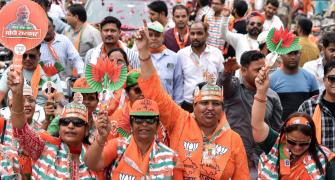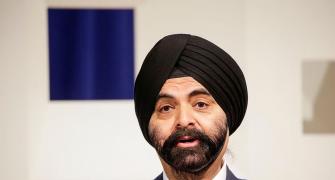"As it stands, the situation is both strange and unusual in that the Indian authorities know more about this important proposal than we in Congress. However, I trust that this will soon be ameliorated," said Hyde.
Indo-US deal may die in Congress
He was obviously reacting to the recent remarks by Under Secretary of State for Political Affairs, Nicholas Burns--the Bush Administration's point man to push the agreement through Congress.
Burns, in a speech at the Asia Society last week and the question and answer session that followed, had expressed optimism that Congressional approval was a formality, a sanguineness he reiterated in New Delhi a few days later. He also predicted that the agreement would be approved by Congress before President Bush visits India sometime in late February next year.
"Clearly, there is ample time for extensive consultations to be held as I am aware on no pressing deadline for action," said Hyde, who had convened a hearing of the Committee titled "The US-India Global Partnership:The Impact of Nonproliferation" to hear from some of the leading nonproliferation advocates in the country.
US committed to implementing N-deal: Burns
"It would be grossly irresponsible for this Committee and for the Congress as a whole to act with unnecessary haste regarding a subject which can bear no false steps," he said. "I am both gratified and concerned by statements from the administration regarding this process," he said.
"Although this Committee and the Congress as a whole have received little if any information from the Administration regarding either the details of its ongoing discussions with the Indian government or the legislation it plans to introduce, I am certain that this oversight will soon be corrected," he added.
He "was pleased to hear Under Secretary Burns state at our last hearing that the Administration plans to work closely with this Committee and not seek to circumvent it in favor of a more hasty, unconsidered and, frankly, quite dangerous approach."
Nuclear deal unique to India: US
He noted that "these same points were conveyed in a recent letter to Secretary (Condoleezza)Rice that was signed by the Chairmen and Ranking Members of our Committee and those of the Senate Foreign Relations Committee."
"Having said that, I am troubled by a number of public statements by Administration officials that Congressional support for the overall agreement is broad and that our consent is virtually guaranteed," he said.
"I do not understand how these statements could be made with Congress having yet to be fully consulted. I know that I have not been. I attribute this to a robust confidence that the legislative and executive branches can find a mutually acceptable approach, a expectation that I fully share."
But "it is important to keep in mind that, although the Executive Branch has wide latitude to conclude agreements with countries, it is the province of the Congress to make or amend laws. Our responsibilities to the American people and to posterity simply will not permit any course other than a full and complete consideration of the many profound consequences, both those obvious and those not readily revealed to impatient eyes."
The Ranking Democrat on the Committee, Congressman Tom Lantos of California, endorsed Hyde's "carefully crafted and very thoughtful statement," and agreed "very strongly, that there is no hurry in reaching a decision on this matter."
'India is closely tied to a terrorist State'
"This is a matter of utmost gravity and importance, and it must be dealt with extreme care and caution," he said.
In a September 8 hearing, Lantos had warned that if New Delhi did not support the US efforts to isolate Iran and bring its non-compliance with the Nuclear Nonproliferation Treaty before the UN Security Council, the US-India relationship would "go down the tubes."
This time, he praised India's vote on September 24 at the International Atomic Energy Agency against Iran, saying he was "pleased" that New Delhi "demonstrated that it takes this new partnership with Washington seriously," by giving "critical support to US efforts in the IAEA to refer Iran's suspicious nuclear activities to the UN Security Council."
"Defying expectations, India's representative voted with the United States and the European Union to find that Iran was not in compliance with its safeguards obligations," he noted.
Gentle persuasion' changed India's mind: US
"India's vote and its willingness to align itself with US and European efforts to keep Iran from developing the ultimate terror weapon have come as a shock to the Ayatollahs of Terror in Tehran," he said.
Tehran had reportedly counted on an "eastern strategy" of relying upon its neighbors and trading partners to undermine any attempts to hold Iran to its commitment under the Nuclear Nonproliferation Treaty not to acquire of develop nuclear weapons. That strategy is failing "due in no small measure to India's vote," Lantos said.
"Tehran's crude threats to punish India and others with oil cutoffs and trade restrictions only increased these countries' suspicions and resolve to hold Tehran accountable. Tehran has since backed down from its threats, aware as never before that it has more to suffer from trade sanctions than those it would punish."
"India's vote and continued support in stopping the Iranian nuclear weapons program is in keeping with the nonproliferation regime established in the US-India initiative," he said.
With "India's strong support in the months and perhaps years to come, I am more hopeful than ever before that diplomatic and economic pressure may yet turn the Ayatollahs of Terror from their demented path toward nuclear weapons and the consequent further economic ruin of their long-suffering country."
In a surprisingly conciliatory vein, Lantos also said he would like "to highlight at least one other crucial but unappreciated benefit to the global nonproliferation regime from the US-India Joint Statement," of July 18 signed by President Bush and Prime Minister Manmohan Singh.
By committing to continue its moratorium on further nuclear weapons tests as part of a US-India bilateral undertaking, New Delhi has in effect agreed to an international commitment not to test again, so long as both sides fulfill their pledges," he noted.
"This is an important development. If India does not test, then Pakistan may also not test again."
"In practical effect then, India's commitment could have significant regional nonproliferation benefits. If the Nuclear Suppliers Group, of which the United States is a founding member, agrees to allow member states to cooperate with India under similar terms as the Joint Statement, then India's non-testing commitment could expand into a binding multilateral deal. That, I submit, would be an even greater benefit to the international nonproliferation regime."








